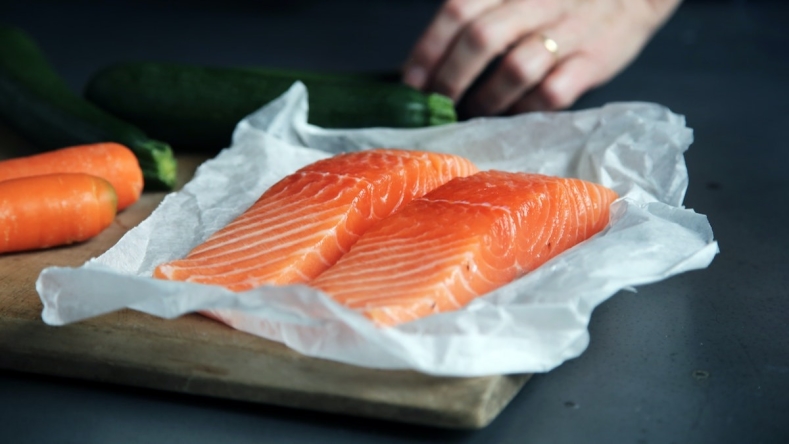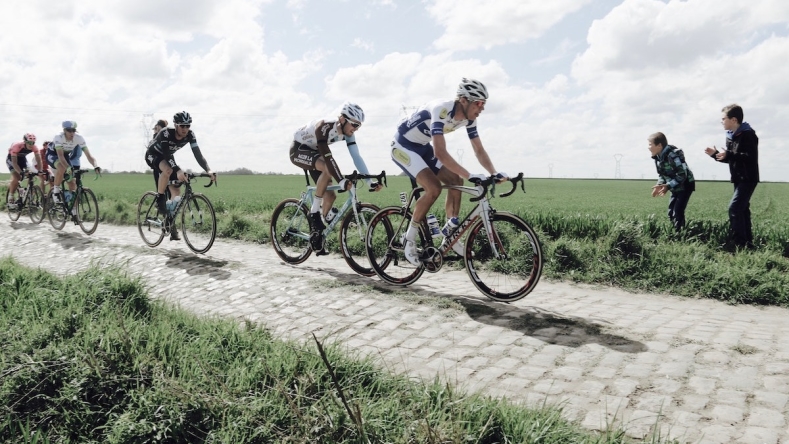Does going keto improve cycling performance?
The ketogenic diet is hotter than ever and now, several athletes are opting to follow this very low carb, high fat and moderate protein eating approach. But does it hurt sports performance? We took a look at the latest research on keto for cycling performance.

Carb-restricted ketogenic diets have become wildly popular in the last five years. This trendy low-carb, high-fat diet has gained a cult following among those wanting to lose weight, increase energy and improve blood sugar control.
Keto is proving to be much more than just a quick way to lose weight, though [1]
More and more endurance athletes — including Tour de France cyclists like Chris Froome and Romain Bardet — are also adopting carbohydrate-restricted ketogenic diets in hopes it will boost their performance. Carbs have long been favored for fueling exercise, but some believe a keto-adapted athlete might be able to perform better because their bodies are primed to pull energy from a variety of sources, including free fatty acids, ketone bodies, and fat- and protein-derived glucose, in addition to muscle and liver carbohydrate (glucose) stores [9]
It sounds good in theory, but does going keto really improve cycling performance? Before we dive into the research let’s first take a look at what a ketogenic diet is and how your metabolism changes when you trade carbs for fat.
What is the ketogenic diet?
A ketogenic diet is a high-fat, moderate protein, low carbohydrate diet comprising about 70-80% calories from fat, 20-25% calories from protein, and a scant 10-40 grams of carbohydrates per day [7]

What happens to your body when you eat keto?
By drastically cutting carbohydrate intake and simultaneously increasing fats, your body becomes incredibly efficient at burning fat, largely because carbs are in short supply. Over time, the body kicks into a metabolic state called ketosis, where fat replaces glucose as the body’s primary fuel source. Unlike Atkins® and other low-carb diets that put a lot of emphasis on protein, protein is restricted on the ketogenic diet. This is because, if consumed in high amounts, protein converts to glucose which can interfere with ketosis [8].
Once you start a ketogenic diet, it can take several weeks for your body to switch from using carbohydrates as its main energy source to using fats. The initial adaptation period often referred to as “keto flu”, can have some unpleasant side effects, including headaches, fatigue, nausea, increased hunger, sugar cravings, muscle cramps, poor concentration, and diminished energy. Athletes appear to have a longer adaptation period likely due to the heightened stress and energy demands placed on their bodies. Without long-term adaptation to the ketogenic diet (which can take several months), athletes might experience some additional, not-so-pleasant side effects including low blood sugar, significantly impaired performance, and slower recovery [9]
.
Once these adaptation symptoms subside, many keto-converts report a decrease in cravings and increased energy and clarity. Keto-adapted athletes often report improved energy for both training and competition, improved inflammatory-related symptoms, reduced muscle soreness, and GI distress [9]

Does eating keto help (or hurt) cycling performance?
A body that is primed to utilize energy from a variety of sources sounds like it might have some promising performance benefits for cyclists, but can ketones and fatty acids really supersede glucose during exercise?
At this time, limited research shows no clear performance benefit to athletes following a ketogenic diet — endurance or otherwise [ 7 9 [9]
The keto diet has two big downsides for athletes: limited glucose availability and increased oxygen demands.
Despite increased fat burning, endurance capacity in keto-adapted athletes still appears to be limited by glucose availability [9]
[
9
,
10]
.Another reason why keto might not offer bigger performance benefits is that ATP (energy) production from fatty acids requires more oxygen than glucose does
[
9
,
10]
. These greater oxygen demands decrease efficiency during exercise and thus limit the potential performance benefits for athletes following a strict ketogenic diet.It is worth mentioning that, while a ketogenic diet likely won’t improve cycling performance, it might not hurt it either if you’re working below maximum effort. A multi-study review found keto-adapted endurance athletes (including cyclists) were able to maintain moderate-to-vigorous intensity endurance exercise performance while following a keto diet [9]
[
9
]
.One more thing to keep in mind is that the keto diet is highly restrictive and while it may not completely tank your cycling performance, you may fall short on other nutrients such as fiber, calcium, magnesium, selenium, vitamin C and B-vitamins. And over time, these nutrient deficits may leave you feeling pretty lousy.
Summary
If you’re a trained cyclist, relying on fat as your primary fuel source likely won’t help you break any personal or world records. That’s not to say you can’t still perform well on a keto diet — just keep in mind the length of your adaptation period is key. If you’re committed to keto and have a longer training ride or race on the agenda, having some carbs handy may temporarily kick you out of ketosis but will help you keep up with your carbohydrate-fed competitors.
Disclaimer: The text, images, videos, and other media on this page are provided for informational purposes only and are not intended to treat, diagnose or replace personalized medical care.

Key takeaways
The ketogenic diet is a very low carb (10-40g/ day), high fat, and moderate protein diet.
Early evidence suggests that the keto diet may be beneficial for weight loss, diabetes, cancer, epilepsy, Alzheimer’s, and Parkinson's disease [2,3,4,5,6].
Research to date suggests that the keto diet is not ideal for peak performance because it increases the oxygen cost of exercise [10].
For recreationally active athletes, working at submaximal intensities, the keto diet does not appear to produce performance decrements once fully adapted [9].
References
Bueno, N. B., de Melo, I. S., de Oliveira, S. L., & da Rocha Ataide, T. (2013). Very-low-carbohydrate ketogenic diet v. low-fat diet for long-term weight loss: a meta-analysis of randomised controlled trials. The British journal of nutrition, 110(7), 1178–1187.
https://doi.org/10.1017/S0007114513000548
Westman, E. C., Tondt, J., Maguire, E., & Yancy, W. S., Jr (2018). Implementing a low-carbohydrate, ketogenic diet to manage type 2 diabetes mellitus. Expert review of endocrinology & metabolism, 13(5), 263–272.
https://doi.org/10.1080/17446651.2018.1523713
Weber, D. D., Aminazdeh-Gohari, S., & Kofler, B. (2018). Ketogenic diet in cancer therapy. Aging, 10(2), 164–165. https://doi.org/10.18632/aging.101382
Ułamek-Kozioł, M., Czuczwar, S. J., Januszewski, S., & Pluta, R. (2019). Ketogenic Diet and Epilepsy. Nutrients, 11(10), 2510. https://doi.org/10.3390/nu11102510
Rusek, M., Pluta, R., Ułamek-Kozioł, M., & Czuczwar, S. J. (2019). Ketogenic Diet in Alzheimer's Disease. International journal of molecular sciences, 20(16), 3892. https://doi.org/10.3390/ijms20163892
Phillips, M., Murtagh, D., Gilbertson, L. J., Asztely, F., & Lynch, C. (2018). Low-fat versus ketogenic diet in Parkinson's disease: A pilot randomized controlled trial. Movement disorders : official journal of the Movement Disorder Society, 33(8), 1306–1314.
https://doi.org/10.1002/mds.27390
Kerksick, C. M., Wilborn, C. D., Roberts, M. D., Smith-Ryan, A., Kleiner, S. M., Jäger, R., Collins, R., Cooke, M., Davis, J. N., Galvan, E., Greenwood, M., Lowery, L. M., Wildman, R., Antonio, J., & Kreider, R. B. (2018). ISSN exercise & sports nutrition review update: research & recommendations. Journal of the International Society of Sports Nutrition, 15(1).
https://doi.org/10.1186/s12970-018-0242-y
Melkonian, E. A., Asuka, E., & Schury, M. P. (2020). Physiology, Gluconeogenesis. In StatPearls. StatPearls Publishing.
McSwiney, F. T., Doyle, L., Plews, D. J., & Zinn, C. (2019). Impact Of Ketogenic Diet On Athletes: Current Insights. Open access journal of sports medicine, 10, 171–183.
https://doi.org/10.2147/OAJSM.S180409
Burke, L. M., Sharma, A. P., Heikura, I. A., Forbes, S. F., Holloway, M., McKay, A., Bone, J. L., Leckey, J. J., Welvaert, M., & Ross, M. L. (2020). Crisis of confidence averted: Impairment of exercise economy and performance in elite race walkers by ketogenic low carbohydrate, high fat (LCHF) diet is reproducible. PloS one, 15(6), e0234027. https://doi.org/10.1371/journal.pone.0234027




